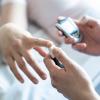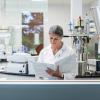Chloe Clapham, Clinical Laboratories Quality Manager at Balfour Hospital, gives a guided tour of her Orkney lab.

Orkney consists of over 70 islands off the north-eastern tip of Scotland. Famed for its breath-taking wildlife, unspoilt beaches, wild weather, and Neolithic heritage, Orkney is a prime example of “remote and rural” healthcare.
The multidisciplinary laboratory, located at Balfour Hospital, is staffed by a dedicated and flexible team of seven biomedical scientists and four medical laboratory assistants, who work to maintain a continual service in ever-changing and difficult circumstances. Simple tasks – such as sample transport, ordering, recruitment and service engineer visits – are a few examples of how this remote locale adds an additional layer of complexity to providing a diagnostic service.
Serving a population of around 22,000, the laboratory provides biochemistry, haematology and microbiology services to the hospital, as well as GP surgeries (six on Orkney mainland and nine on the islands scattered towards the horizons).
Daily samples are received via small passenger ferries and even smaller propeller aircraft. In the dark winter months travel disruptions are the norm, with flights grounded due to high winds, ferries cancelled due to stormy seas and the closure of the Churchill Barriers, which link the south-eastern islands of South Ronaldsay and Burray to the main island. When the wind does drop, thick fog can roll in, grounding flights and cutting the islands off from the Scottish mainland.
Measures are in place to actively ensure that the service is maintained. Orders are placed far in advance as prolonged delays or re-ordering can result in service limitations, such as running one analyser to conserve reagents, or extending on-call services in the event of a reduced point-of-care repertoire.
In extreme cases, samples may have to be referred to Aberdeen, 180 miles away, by aircraft. Consequently, staff receive additional training in order to troubleshoot and repair analyser problems. However, since the implementation of a Managed Service Contract in 2016, duplicate analysers and a new point-of-care service provide much needed resilience to lessen these risks.
As a multidisciplinary service, all staff receive comprehensive on-site training in biochemistry and haematology. With a staff base largely consisting of non-transfusion specialities, the laboratory delivers a pioneering blood transfusion service whereby samples are sent via air to the Scottish National Blood Transfusion Service (SNBTS)
in Aberdeen.
This can result in delays ranging from a few hours to two days, and once SNBTS staff have tested samples, blood components are electronically issued on site by Orkney biomedical staff. Approximately 50 samples a month are referred for testing and the laboratory holds group O blood only, with a total of 14 O negative, 14 O positive and four emergency O negative units. There is also a small stock of FFP, cryoprecipitate and octaplas. If required, blood is crossmatched in Aberdeen and transported to Orkney.
The challenging and varied nature of specialising in remote and rural pathology combined with island living makes working at NHS Orkney a truly unique experience.




